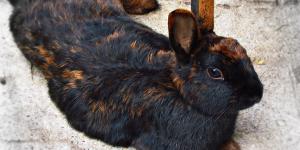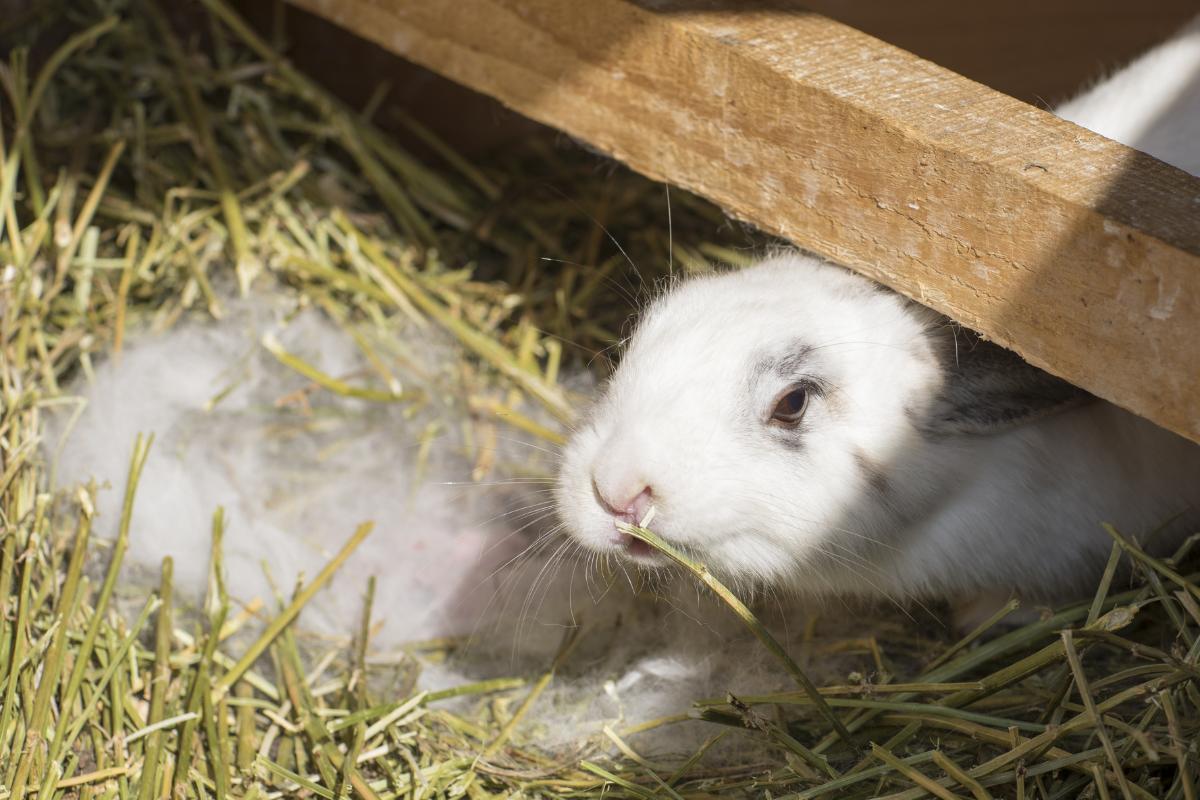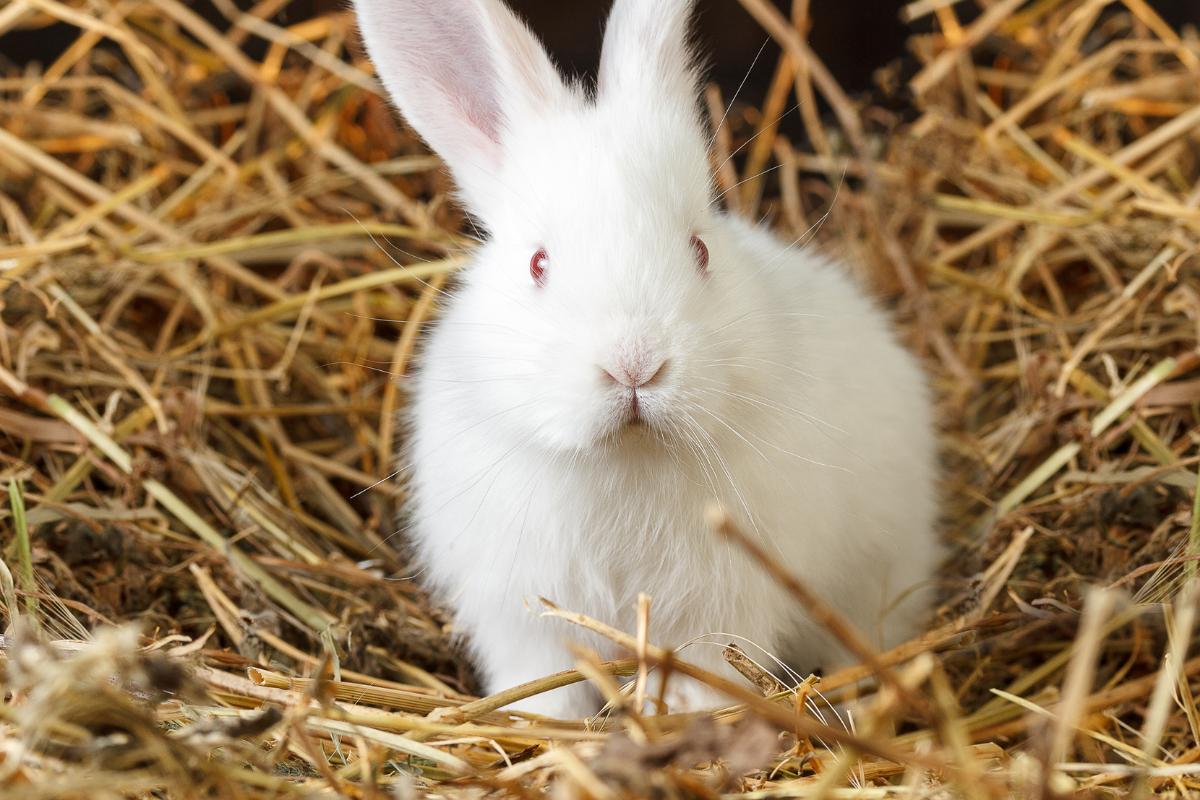My Rabbit Is Nesting But Is Not Pregnant



See files for Rabbits
When a rabbit is pregnant, they will nest when they are about to enter labor. This nesting behavior is very important to offer both mother and her kits the security she needs to care for vulnerable offspring. Female rabbits will reach sexual maturity around 4 to 8 months of age, after which time they can become pregnant. Their have induced ovulation when they mate, not an estrus cycle like some animals. Their pregnancy lasts around one month and then they give birth. This is all normal in a pregnant rabbit, but what if my rabbit is nesting, but is not pregnant?
At AnimalWised, we look at pregnancy-related behaviors in rabbits that are not pregnant. We look into something known as false pregnancy in rabbits, a hormonal condition when the rabbit believes they are pregnant even though they are not.
What is nesting in rabbits?
Nesting is the process of preparing for labor in rabbits. In a pregnant rabbit, it will begin shortly before they go into labor. The gestation period for rabbits, which is the time between conception and birth, typically lasts around 28 to 31 days. As the due date approaches, a pregnant rabbit may exhibit nesting behavior as part of her preparations for giving birth to her kits (baby rabbits).
Signs that a pregnant rabbit is nesting include:
- Gathering materials: the rabbit may gather hay, straw, or other soft materials to create a nest in a secluded area.
- Frequent rearranging: she may spend time rearranging the nesting material to her liking.
- Pulling fur: some rabbits pull fur from their chest and abdomen to line the nest, providing insulation and comfort for the newborns. It is important to distinguish this behavior from a rabbit pulling their fur out because they are sick or have stress-related issues.
- Restlessness: the rabbit might become more restless or anxious as labor approaches.
Nesting in wild rabbits is particularly important because they are more vulnerable to predators and the elements. By hiding somewhere safe, the mother rabbit can keep her kits out of harm's way. She can ensure they are warm and not exposed to unhygienic conditions which can result in disease.
It's important to note that not all rabbits display these signs. Individual behavior can vary. Providing a quiet and secure space with appropriate nesting materials is recommended to support the rabbit during this time. Additionally, monitoring the rabbit closely for any signs of distress and seeking veterinary assistance if needed is crucial for a smooth and healthy birthing process.
Why is my rabbit nesting if they are not pregnant?
The first thing we need to do to understand why a rabbit will nest if they are not pregnant is to be positive they are not pregnant. While it is harder to tell the sex a young rabbit, there are many stories of rabbit guardians thinking they have a rabbit of the opposite sex. You may think you have a hutch full of male rabbits, but if one has been incorrectly sexed and is actually female, they can become pregnant.
Sometimes it is simply that a guardian has not safeguarded against pregnancy. You can keep male and female rabbits together, but if they are not of the same litter and not neutered, they can mate and become pregnant. Male and female littermates are unlikely to mate, but they are likely to fight if they are not neutered. This is due to their hormone levels.
To avoid pregnancy, spaying or castrating rabbits is the best option. In addition, there are many other benefits of neutering rabbits to improve their health and to avoid behavioral problems. The surgical intervention of neutering is very safe and highly effective.
If you have a rabbit that is neutered or you are certain they have not mated, then nesting can seem like odd behavior. In the following sections, we look at the possible reasons a rabbit will nest if they are not pregnant.
Environmental factors
Female rabbits have a very strong maternal instinct, even if they are not mothers. It is important to note that nesting behavior isn't always a sign of a problem. Rabbits will naturally want to feel safe, so their innate instinct will cause them to create safe spaces for themselves. This could be the reason for the nest, but it doesn't mean they have any problems.
However, all rabbits are very sensitive to environmental factors. If there are changes in their environment which they perceive as threatening, it can result in them wanting to seek security. Just as nesting in pregnant rabbits is designed to keep their offspring safe, nesting can be a way for any rabbit to seek security.
Various changes in the rabbit's environment can cause them stress. This can be moving to a new hutch, being placed somewhere else in the home, loud environmental noises or the adoption of a new pet into the family. Since rabbits are so sensitive, they can respond in many different ways which are particular to the individual. Nesting is one such way.
Some of the main environmental causes of stress in rabbits are:
- Loud noises: rabbits are prey animals, and sudden loud noises can startle and stress them.
- Predator presence: the sight, sound, or smell of potential predators, including other pets, can cause stress.
- Changes in environment: moving to a new home, changes in their living space or rearranging their enclosure can be stressful.
- Inadequate housing: small or poorly designed enclosures, lack of hiding spots or insufficient enrichment can lead to stress. Learn how to build a rabbit hutch if you want to know more about their housing needs.
- Unfamiliar people or animals: rabbits may feel stressed around strangers or unfamiliar animals.
- Loneliness: rabbits are social animals, and they can get stressed if left alone for extended periods.
- Inadequate diet: poor nutrition or sudden changes in diet can impact their well-being.
- Handling and confinement: Improper handling or excessive restraint can stress rabbits. This can show in other signs such as the rabbit peeing on you when you pick them up.
- Lack of mental stimulation: boredom and lack of mental stimulation can contribute to stress.
When a rabbit is exposed to stressors, they can react in various ways. Nesting is only one of them. They can also perform something known as stereotypies. These are repetitive actions which have no discernable purpose. Although it is normal for a rabbit to thump their feet on the ground, if they do this all the time for no reason, it may be a sign of stress.
Strange noises, running round in circles, pulling their fur out and many other actions can be signs of stress in rabbits, in addition to nesting when not pregnant. We should always check on our rabbit's welfare by ensuring they have the proper diet, a suitable place to live and are free from stress. If you are not meeting their needs, their health and well-being will be affected.

Health problems
Disease is another important reason that rabbits will be stressed and may nest although they are not pregnant. A rabbit will not know they are sick, but they will respond to changes in their body such as organ failure or pain. These problems can cause them to become frightened and they will nest to help feel secure. Unfortunately, rabbits are good at hiding their symptoms of illness until the problem is advanced.
Certain diseases may be more likely to cause nesting behavior even when a rabbit is not pregnant. For example, there various hormonal diseases which may cause them to exhibit nesting behaviors. This is especially the case with female rabbits. Increased progesterone can lead to the rabbit's maternal instinct kicking in. This is something that can happen with diseases such as uterine tumors or persistent corpora lutea.
Hormonal diseases in female rabbits can lead them to develop something known as false pregnancy. We look at this condition in more detail in the section below.
False pregnancy in rabbits
Also known as pseudopregnancy or psychological pregnancy, false pregnancy in rabbits is when the rabbit thinks they are pregnant when they are not. It is not merely a psychological issue. If the rabbit's hormone levels change, it can cause their body to also change physically. This is because the increased secretion of hormones such as progesterone causes the body to respond as if they were actually pregnant.
In addition to nesting, the female rabbit can carry out other pregnancy-related behaviors. These include the following:
- Concern
- Maternal aggression
- Abdomen licking
- Breast enlargement
- Milk secretion
- Alopecia
This process usually occurs in situations that can cause induced ovulation, such as excessive petting, presence of a neighboring male, mating between females that live together, and copulation without fertilization. Complications that may be associated with this process are mastitis, breast dermatitis and infections of the mammary glands.
Learn more with our article on the causes, symptoms and treatment of mastitis in rabbits.

What should I do if my rabbit makes a nest, but is not pregnant?
In the case of nesting without being pregnant, the first thing of all is to collect all the available information. As we have stated, it is possible the rabbit is merely exhibiting natural behaviors. In these cases, you will not need to do anything. Simply, maintain the right level of care and always safeguard their health.
Any change in their environment can result in nesting behavior when not pregnant. It will be vitally important to detect it and return to the initial situation if possible. For example, if you have just adopted a cat and they routinely harass the rabbit, this is likely the cause of their stress. Prevent access by the cat and provide reassurance to the rabbit.
If you think that a disease in rabbits may be the reason for them nesting, take them to a veterinarian. Only they will be able to carry out the necessary diagnostic tests and administer the correct course of treatment. This can be in the form of symptom management, drug treatments or even surgical intervention, depending on the cause.
In the case of a false pregnancy, the symptoms should disappear on their own after 2 or 3 weeks. In some situations in which the symptoms are harmful to the rabbit, medical treatment may be required. This could be in the case of anti-prolactin drugs such a cabergoline. Surgical treatment may be require in rare cases.
Regardless of the cause of the rabbit's nesting behavior when not pregnant, we recommend neutering. This will not only help to avoid this behavior, but it avoids actual pregnancy and helps improve their life expectancy due to the health benefits it provides. It will also helps reduce problem behaviors such as fighting with other rabbits.

This article is purely informative. AnimalWised does not have the authority to prescribe any veterinary treatment or create a diagnosis. We invite you to take your pet to the veterinarian if they are suffering from any condition or pain.
If you want to read similar articles to My Rabbit Is Nesting But Is Not Pregnant, we recommend you visit our Other health problems category.







